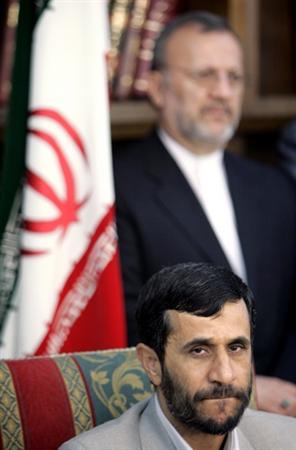
This Is Getting Hotter
We live in a world of much war and chaos. The powers-that-be are busily trying to add to the mix.
The Americans and the Europeans want to move swiftly against Iran, and to that end, the resolution will be introduced in New York on Wednesday or Thursday, according to R. Nicolas Burns, the under secretary of state who has led American diplomatic efforts concerning Iran.Oh, I'm glad that sanctions would only come after the two-months of brow-beating. I guess that's the good news: No Sanctions for now. So the time table of 2 months puts the war off by one month. I'm revising my prediction to August.
"The Security Council has no option now but to proceed under Chapter 7," Mr. Burns told reporters in Paris, referring to the article in the United Nations Charter that makes resolutions mandatory under international law and opens the way to sanctions or even military action.
He predicted a long, drawn-out process that could take up to two months. Mr. Burns was in Paris for preliminary talks with the political directors of the four other nations that along with the United States are permanent members of the Security Council — Britain, China, France and Russia and with Germany.
The talks were designed to pave the way for a meeting of their foreign ministers hosted in New York on May 9 by Secretary of State Condoleezza Rice. It would be part of an American and European-led campaign to forge a common position against Iran after it failed to comply with an informal Security Council deadline last Friday to suspend uranium enrichment.
The draft resolution, which has not been made public, expresses "serious concern" that Iran has not complied with its international commitments and calls on it to stop producing enriched uranium, which can have both peaceful and military uses, and return to the negotiating table, according to officials involved in drafting in.
In its current form, the resolution does not include a fixed deadline for compliance or a specific threat of action against Iran if it does not comply, the officials said.
Iran, which maintains that its nuclear program is peaceful, has remained steadfast in its position that it will never give up its right to enrich uranium, and in the past month has instead accelerated that program.
In Tehran, Iran's Foreign Minister Manuchehr Mottaki expressed confidence today that both Russia and China, two of Iran's most important trading powers, will veto any Security Council resolution that imposes economic sanctions against Iran.
"There is a very wrong assumption held by some that the West can do anything it wants through the Security Council," Mr. Mottaki told the hardline Tehran daily Kayhan.
But Mr. Burns stressed that sanctions would only come later. He said that oil and gas sanctions were not under discussion, but predicted in "a month or two or three" there would be international support for sanctions. He mentioned technology imports with civilian and military uses, a travel ban on Iranian officials and a ban on all arms sales as likely targets.
Asking For It (Part 2)
Iran, in the mean time is threatening Israel "If US acts 'evil'".
"We have announced that wherever America does something evil, the first place that we target will be Israel," ISNA quoted a senior Revolutionary Guards commander, Rear Admiral Mohammad-Ebrahim Dehqani, as saying on Tuesday.Well, if you're so damn worried, then stop provoking it. *Ugh* The stupidity, the stupidity!
Iranian President Mahmoud Ahmadinejad has called for the Jewish state to be "wiped off the map".
Iran's deputy oil minister said there was "some possibility" of a U.S. attack on his country over its nuclear program.
"I am worried. Everybody is worried," Mohammad Hadi Nejad-Hosseinian said in New Delhi after talks on a proposed $7 billion pipeline from Iran to India via Pakistan.
UPDATE:
Time Magazine thinks that Iran may be considerably more craftier than the bellicose rhetroic it is throwing around.
Despite the bluster of its president, Iran's rulers appear inclined to echo the call for direct talks, having reportedly made a number of discreet approaches and also public statements expressing a willingness to negotiate. Senior former State Department and NSC officials have indicated that Tehran sought, in a message relayed via Swiss diplomats, to initiate talks on all matters of concern to Washington, with the blessing of Supreme Leader Ayatollah Ali Khamenei in mid-2003, but were rebuffed by Bush administration hawks. Iranian leaders also reportedly made a similar call for secret negotiations on all matters of concern when Iraq's President Jalal Talabani late last year conveyed a U.S. proposal for talks specifically on Iraq. More recently, a number of former NATO foreign ministers who have recently visited Iraq have reported that "influential Iranian leaders" had expressed the desire to hold direct talks with Washington — last week even the bellicose President Ahmedinajad, during a press conference, indicated a willingness to negotiate with the U.S. if Iranian preconditions, which he did not specify, were met.So maybe Iran will come to the negotiating table after all.
Iran's leaders insist that their right to peaceful nuclear activity, including uranium enrichment, be respected. But that demand may translate into a renewed push for a compromise in which Iran accepts that its reactor fuel is enriched in Russia but is allowed to keep a small-scale facility under IAEA supervision for enrichment research purposes. The U.S. flatly rejected such a proposal in March (on the grounds that it would allow Iran to gain important nuclear know-how), but if the alternative is confrontation, it may begin to look more appealing to some of its allies. Both Germany and Russia previously hinted they could support such a plan. And as U.S. allies find themselves caught uncomfortably between Iran's defiance and a U.S. strategy that looks destined to end in confrontation, Tehran may see the advantage in launching diplomatic initiatives of its own.

No comments:
Post a Comment